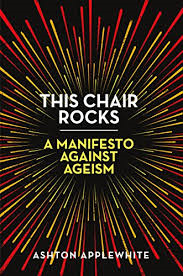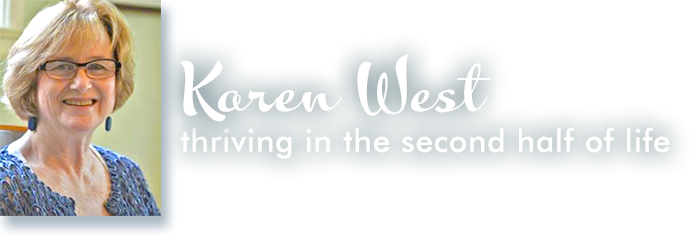(This is my eighth blog entry. I wrote the first four as an introduction to “conscious aging” and “sage-ing,” so if you are new to this topic, I suggest you read my first four entries in order.)
In my last blog entry, I mentioned that people often say “You look great for your age” to me. I’m 71. Occasionally when I’m teaching a class on” conscious aging” or “sage-ing,” someone who has had their consciousness raised will ask me how they should respond when someone says this to them, but it wouldn’t even occur to most people not to happily say “Thank you.” “You look great for your age” is a compliment, right?
Or is it “ageist”? The term “ageism” was coined by geriatrician Robert Butler in 1969, the same year in which “sexism” was created. Nowadays people are often called out for being “sexist,” but when was the last time you heard someone called out for being “ageist”? Even though I rarely hear anyone use this word, I did hear it recently. Bernie Sanders used it after the first Democratic debate when it was suggested that he should “pass the torch” to the younger generation. I’m not sure that I agree with its use in that particular instance, but I was happy to hear him use the word. It is true that there is a lot of “ageism” in our society, but it hasn’t received the same attention as the other “isms” have. And we aren’t going to start calling it out and hopefully start “pushing back,” as Ashton Applewhite, who wrote This Chair Rocks: A Manifesto Against Ageism suggests, until we start recognizing how prevalent, and how destructive, it is.
 Ashton Applewhite has devoted the last twelve years to understanding this topic. In the introduction to her book, she says she started this journey in 2007 because of a chance dinner with her partner’s mother. As book store owner in her 90’s, she was repeatedly asked when she was going to retire. She suggested that Aston should write something about this. Applewhite took her suggestion and started interviewing people over 80 who work.
Ashton Applewhite has devoted the last twelve years to understanding this topic. In the introduction to her book, she says she started this journey in 2007 because of a chance dinner with her partner’s mother. As book store owner in her 90’s, she was repeatedly asked when she was going to retire. She suggested that Aston should write something about this. Applewhite took her suggestion and started interviewing people over 80 who work.
Her first interview was with Marcia Muth, who was eighty-eight. Marcia had been a folk art painter and teacher, but she had to stop teaching because of chronic bronchitis and an oxygen tank. But, as she said, “it doesn’t interfere with the painting, that’s the important thing.” She told Applewhite, “Your life does change as you get older…You get into what’s important and what’s not.” And when she advised Applewhite not to fear old age, she said, “Your years can be just as wonderful as you get rid of some of the anxiety people suffer from. And I find my eighties have been even more fun than my seventies were.” (3)
I love how Applewhite responded to this advice. In This Chair Rocks, she writes, “The possibility that life could become more fun in your eighties had never crossed my mind. Nor that growing a little shorter of breath each year would fail to terrify. Nor that an ever more circumscribed life could be an ever-greater source of personal growth and specific pleasures. Nor that such joyful clarity would be rooted in awareness—not denial—that time was short and therefore to be savored.” (3–4) In an earlier blog entry, I wrote about the book Life Gets Better: The Unexpected Pleasures of Growing Older by Wendy Lustbader. One of the main reasons that I love teaching about “conscious aging” and “sage-ing” is that I’m bringing this message of “unexpected pleasures” to more and more people, both young old.
In blog entry #4, I recommended you read the book From Age-ing to Sage-ing by Rabbi Zalman Schachter-Shalomi, because it will change the way you see aging. I recommend Ashton Applewhite’s This Chair Rocks for the same reason.
One of the reasons so many of us have so much fear is that we picture ourselves being confined to a nursing home sometime–maybe even in our 60’s. Actually, this will be true for only 4%. We’re also afraid of being sick and dependent, but actually over half of people over eighty-five can take care of themselves just fine. And even worse, we think we’ll most likely have to struggle with depression when we’re old, but actually the “U‑curve of happiness” tells us that people are the happiest at the beginning and the end of their lives. (4–5)
How is that possible? I can’t wait to share more about what Ledbetter calls “the unexpected pleasures of growing older” in future blog entries. If you journal, I suggest you take some time to think about and write down what you think are some of these “unexpected pleasures,” or even better share what you think in the comment section of this blog.
To contact me, please call me at 651–399-9571 or email me at karenw0214@gmail.com I would love to have you take a minute to let me know what you think of my blog.


6 thoughts on ““That’s just the way it is””
Karen, thank you for exposing me to books about aging. I enjoyed reading “Life Gets Better” and have recommended to several friends. You might, however, have someone spellcheck your blog to ensure that the authors’ names are spelled correctly. FYI
Thank you so much for your comment, Cynthia! I can’t believe I made such a silly mistake–Thank you so much for telling me.
I really liked this book as it pointed out that my fears about aging will probably not come true.
It was a dose of reality and it helped me look at my own assumptions and negative thoughts about aging. Good summary Karen.
Thank you so much for your comment, Cheryl. I also like the book, because it makes me more aware of ways in which I’m not appreciating what an opportunity this new stage in my life can be.
I’ve hearing about Ashton’s book and your references to it make me want to get my hands on it even more. Thanks for whetting my appetite.
You are so welcome! Thank you for making a comment.